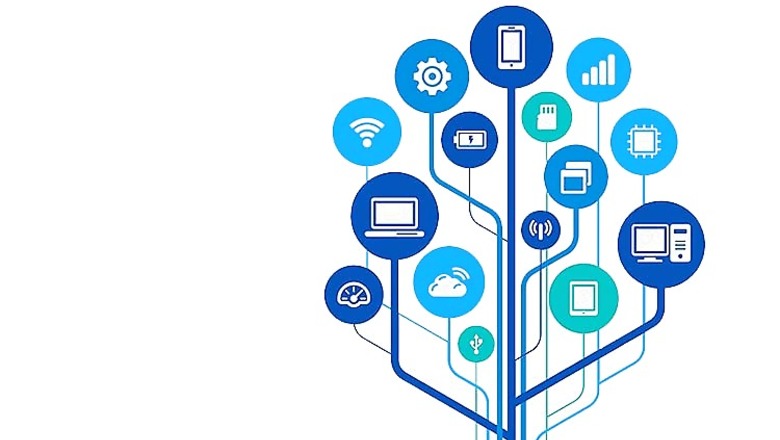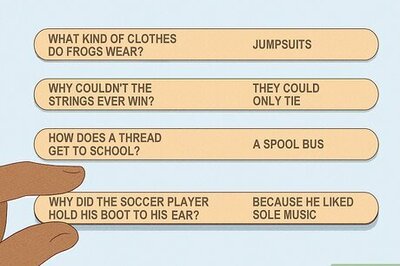
views
"We won't experience 100 years of progress in the 21st century - it will be more like 20,000 years of progress (at today's rate)," wrote futurist Ray Kurzweil in 2001.
Just think about how much things have changed since opening up of the Indian economy in 90s - wireless internet, online government services, smart phones and social media. Then try to imagine how vastly different things will be in 2020, just 5 years from today.
Take the financial services industry as an example. Growing up with jingles of Dhara oil and washing powder Nirma, who would have thought Bollywood bigwigs would be selling mobile wallets that move money at the speed of light. Who would have thought sending flowers to your mom on her birthday would take 2 minutes despite sitting in a different continent. Who would have thought a palm-sized device could save you bank trips ... forever!
A lot has changed over the past 25 years though the 90s just seem like yesterday. If we look at the impact of technology on our daily lives, the new digitised version is certainly a refreshing change. Here are 5 things technology gave us, which we would never want to give up.
1. Communication: Video beats trunk calls
 (Image: Shutterstock)
(Image: Shutterstock)
We have come a long way from booking long-distance calls to hitting Skype or Hangout. Long letters get delivered as electronic mail in seconds and telegram is more popular as an app. Earlier, all long-distance calls were operator-assisted. Completion of such calls was time-consuming because each call was handled by multiple operators in multiple cities. But when Whatsapp was acquired by Facebook, it had just 35 engineers and reached more than 450 million users.
2. News: Twitter beats newspapers
 (Image: Shutterstock)
(Image: Shutterstock)
There was a time when the morning newspaper was more than a habit. It was the earliest daily source to catch up on national and world affairs. 24*7 news channels changed that to an extent but free access to digital journalism has been a game changer.
Today, by the time news gets printed on your favourite newspaper, Twitter has already given all the scoops and aggregators like Feedly have shared each websites' viewpoint on a single platform. Why care for one magazine when one platform provides every possible piece written on a trending topic.
3. Money matters: Smartphones beat bank queues
 (Image: Shutterstock)
(Image: Shutterstock)
For many young adults, the first tryst with banks and their 'procedures' would have been college. A few desks, grumpy faces, the cap-less Reynolds pen tied to the counter, jumbled up forms and a security guard helping unassuming students find the 'demand draft guy'.
Today, swanky machines at bank branches help you deposit your own cash. Dozens of mobile apps make funds transfer possible even for a small dinner you shared with friends. Even financial services, which for most of us is limited to loans and insurance, is a whole new industry now. At a click, hundreds of pages will share advice on plans and policies. Living in a world that is changing faster than before, many brands now guide customers to a website, not a store. Like this Birla ad which asks prospective investors to choose speed.
-
4. Entertainment: Internet beats TV
There was a time when a whole city would come to a standstill for Mahabharata. Instead of skipping ads, kids would sing along with popular jingles one last time. Soon, the fight for the remote became part of a Cable TV-owning household.
 (Image: Shutterstock)
(Image: Shutterstock)
But now, in the time of Youtube and Hotstar, appointment viewing is long gone. Access to fast internet in every household has made sure no one misses the show they like. Multiple devices serve the needs of every family member over different screens. Video platforms are the only reason a 19-year-old can enjoy classics like Byomkesh Bakshi even though they missed it by an entire generation.
5. Advice: Bloggers beat magazines
 (Image: Shutterstock)
(Image: Shutterstock)
We cannot imagine a world without mobile devices just as we cannot imagine a world without refrigerators. Checking the weather on smartphones and comparing prices on tablets is as logical as it is for us to use a TV remote control. There is so much information available online that people have made professions around sorting it for us. Thus the internet advice machine was born.
Whether it is comparing latest mobile phones or reading about equity-based mutual funds, one click will fill your screen with options. Life advice, finance advice, policy gyaan, consumer complaints or fashion - there's something for every reader.
After all, India today has more mobile phones than toilets and more mobile phones than bank accounts.



















Comments
0 comment